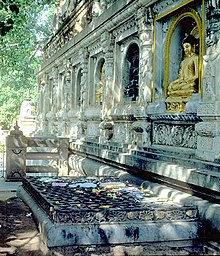|
Bodhimaṇḍa  Bodhimaṇḍa (Sanskrit and Pali) or daochang (traditional Chinese: 道場; ; pinyin: dàochǎng; J. dōjō; T. byang chub snying po) is a term used in Buddhism meaning the "seat of awakening" or "platform of enlightenment". According to Haribhadra, it is "a place used as a seat, where the essence of enlightenment is present".[2] In our world, this refers to the specific spot in Bodh Gaya under the bodhi tree, where Shakyamuni Buddha attained enlightenment, but technically, it can be used to refer to the place of awakening of any Buddha or bodhisattva.[3] In Buddhist cosmology, the bodhimaṇḍa is also said to be the center or navel of the world, i.e. an axis mundi which connects the divine and profane worlds.[3] Bodhimaṇḍas are regularly visited by Buddhist pilgrims, and some have gone on to become popular secular tourist destinations as well. In many forms of Buddhism, it is believed that bodhimaṇḍas are spiritually pure places, or otherwise conducive to meditation and enlightenment. Famous bodhimaṇḍas in India
Famous bodhimaṇḍas in China
See also
References
|